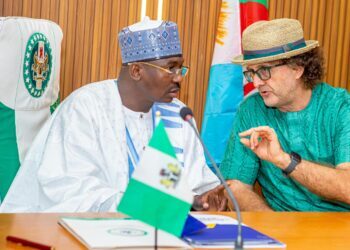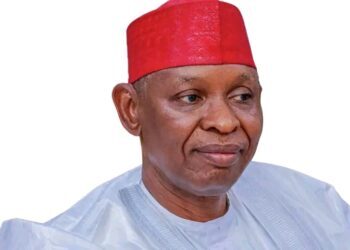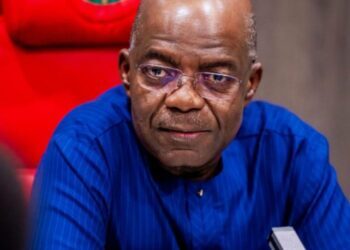By Anietie Ekong
On his inauguration on June 13, 2023 as the President of the 10th Senate, Senator Godswill Akpabio had left no one in doubt that the 10th Assembly would work to promote the interest and wellbeing of the Nigerian people. Senator Akpabio affirmed that his leadership shall be inclusive, that his shall be a servant-leadership and uncommon.
In his inaugural speech, Senator Akpabio had boldly declared: “On my part, Distinguished Senators, I affirm that this leadership shall be yours. It shall be a servant-leadership; it shall be an uncommon leadership. To the Nigerian people, I say this: your dreams, your aspirations and your wellbeing will be at the heart of everything we will do in this Senate.
“It is time now to go forward with the task set before us as a collective body – the promulgation of laws and enactments for the wellbeing and security of the country and as a check on the executive arm of the government of the Federal Republic of Nigeria in our oversight functions. Together, we shall reach and surpass the expectations of the Nigerian people regarding us, and our roles in building a better, safer, more inclusive, prosperous, efficient and ethical country,” he said.
Indeed in the last one year, the Senate under the leadership of Senator Godswill Akpabio has demonstrated an uncommon zeal towards aligning with the goals and aspirations of the Nigerian people and has worked hard through motions, bills and resolutions in promoting the interest and welfare of the common people. The 10th Senate has been unwavering in its commitment to discharging its statutory roles of legislation, representation and oversight for the benefit of the Nigerian people. Under the leadership of Senator Akpabio, the 10th Senate has recorded commendable achievements that have contributed to the consolidation of Nigeria’s democratic process, and which calls for celebration.
It is noteworthy that the election of the leadership of the 10th Assembly attracted nationwide interest. The campaigns were no less intense as the aspirants traversed the length and breadth of the country to solicit for support for their candidacy from traditional rulers to elder statesmen, from socio-political organizations to even religious leaders. It was as if the nation was going into another general election. The country was on edge simply for the election of the presiding officers of the legislature which had not drawn much interest from the general populace before then.
However with the support of the ruling All Progressives Congress (APC) and President Bola Ahmed Tinubu, Senator Akpabio and Senator Barau Jubrin were elected the President and Deputy President of the Senate respectively. The Senators seem to have put their political differences behind and have forged ahead with an agenda to promote legislation that would bring succour to the Nigerian people.
There is a general consensus among the Senators across political divides that Senator Akpabio is a leader who listens to the voices of his colleagues and one who values their input, opinions and concerns to foster an atmosphere of inclusivity and collaboration. The Senate’s unity behind Senator Akpabio reinforces the notion that he commands the respect and support of his fellow Senators. A united Senate, working together towards a common goal, is crucial in achieving legislative objectives that benefit the Nigerian people.
In identifying with the Nigerian people, the 10th Senate has devoted more time through bills and motions to what matters most to the Nigerian people: security and the economy. It is not a secret that Nigerians have faced tough times with the removal of fuel subsidy by the Tinubu administration. Even the President admits as much. The October Cadre Harmonise Analysis on food insecurity had projected that in 2024, Nigeria was expected to see about 26.5 million people grappling with high levels of food insecurity. But the government has worked very hard to cushion the effect of the subsidy removal and provide some succour to the Nigerian people.
To ameliorate the hardship that Nigerians have faced, the Senate had taken several measures to bring some relief to the citizenry. The legislature have had several interface with the economic team of the Federal Government to tackle the country’s poor economy, hunger, and depreciation of the value of the Naira. Part of the measures that the Senate has adopted is the motion that urged the Federal Government to introduce food stamps as an interim measure to address food insecurity in the country.
Food stamps is a supplemental nutrition assistance programme that provides food purchasing assistance for low and no-income people to help them maintain adequate nutrition and health. This measure is aimed at cushioning the resultant hardships and sufferings on the poor. Speaking on the motion which was proposed by the Chief Whip, Senator Ali Ndume, the Deputy Senate President, Senator Jibrin Barau said, “The Senate is open in acting on issues that will help all Nigerians. So the entire Senate commends Ndume for this motion.”
Closely linked with economic issues that the nation has faced, is the issue of insecurity across the country. As a responsive Assembly, the 10th Senate has not shied away from taking measures that can help improve the security situation in the country. It is generally accepted that insecurity in the country has affected food production as farmers can hardly access their farms for fear of being kidnapped or murdered. And the Senate has been greatly concerned about this.
The Senate under the leadership of Senator Akpabio has had several engagements with security chiefs to stem the tide of insecurity across the country. Hardly any week passes without the issue of bringing improved security to the country would not dominate the order paper of the Senate plenary. The lawmakers have often expressed concern over the growing spate of killings, kidnapping and ransom payments, banditry, and other forms of criminality throughout the country.
It is generally believed that insecurity is closely linked with illiteracy, unemployment, porous borders, proliferation of the country with small arms and light weapons, poor tactics in intelligence gathering, and non-compliance with the rule of law. This is why the Senate has often called on the Federal Government to re-engineer the country’s security architecture to make it more responsive.
Due to the yearning of Nigerians, the Senate has also been in the forefront of the advocacy for the establishment of the State Police. According to Senator Akpabio, “We have a responsibility to collaborate with the Executive and contribute our ideas to ensure that our constituents and ourselves, including our children can sleep with their two eyes closed. Security is everybody’s business, and without security, we cannot have progress. We are determined to make laws and pass resolutions aimed at ensuring rapid progress of the country and the immediate improvement of the Nigerian economy. This will not be possible without a secured nation.”
Just like many other Nigerians have felt, the poor state of roads in Nigeria has also been of concern to the 10th Senate. The outcome was the setting up of “an ad-hoc committee to come up with a compendium of all the affected Federal roads and erosion sites across the country either awarded but abandoned by contractors or have not been awarded at all, to be forwarded to the Executive Arm for urgent intervention.” The committee travelled across the length and breadth of the country and it is expected that their findings and recommendations will lead to improve road network across the country.
It is expected that with the support of his colleagues, the strength of his collaborative relationship with President Tinubu, and his avowed commitment to national development, Nigerians eagerly anticipate further positive impacts the 10thSenate will make in shaping the nation’s future.
Ekong, is Special Assistant (Media/Communication) to the President of the Senate.











